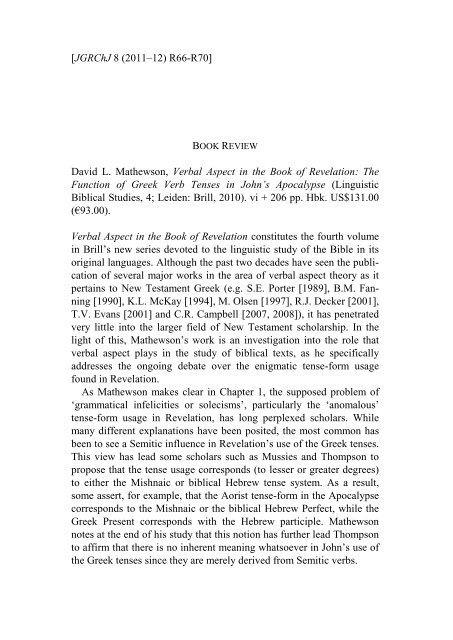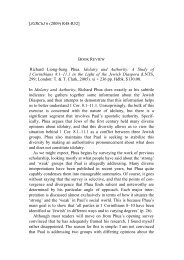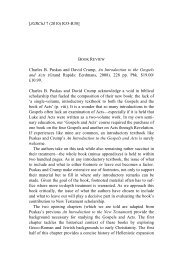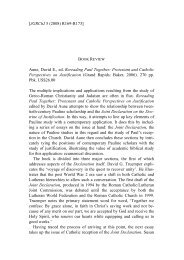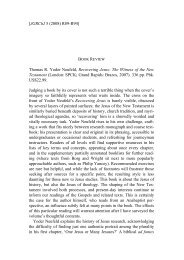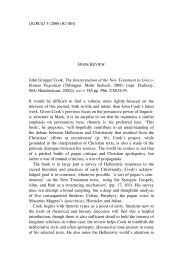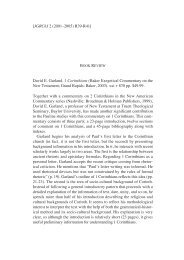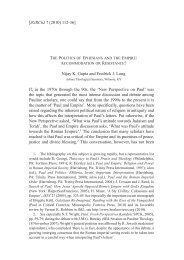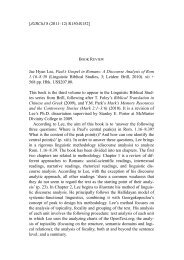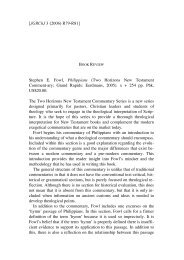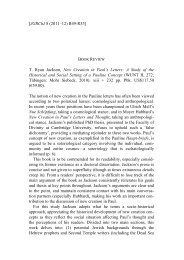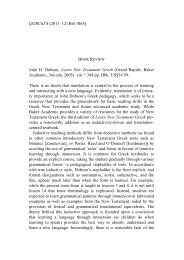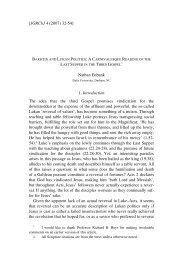David L. Mathewson, Verbal Aspect in the Book of Revelation
David L. Mathewson, Verbal Aspect in the Book of Revelation
David L. Mathewson, Verbal Aspect in the Book of Revelation
You also want an ePaper? Increase the reach of your titles
YUMPU automatically turns print PDFs into web optimized ePapers that Google loves.
[JGRChJ 8 (2011–12) R66-R70]<br />
BOOK REVIEW<br />
<strong>David</strong> L. <strong>Ma<strong>the</strong>wson</strong>, <strong>Verbal</strong> <strong>Aspect</strong> <strong>in</strong> <strong>the</strong> <strong>Book</strong> <strong>of</strong> <strong>Revelation</strong>: The<br />
Function <strong>of</strong> Greek Verb Tenses <strong>in</strong> John’s Apocalypse (L<strong>in</strong>guistic<br />
Biblical Studies, 4; Leiden: Brill, 2010). vi + 206 pp. Hbk. US$131.00<br />
(€93.00).<br />
<strong>Verbal</strong> <strong>Aspect</strong> <strong>in</strong> <strong>the</strong> <strong>Book</strong> <strong>of</strong> <strong>Revelation</strong> constitutes <strong>the</strong> fourth volume<br />
<strong>in</strong> Brill’s new series devoted to <strong>the</strong> l<strong>in</strong>guistic study <strong>of</strong> <strong>the</strong> Bible <strong>in</strong> its<br />
orig<strong>in</strong>al languages. Although <strong>the</strong> past two decades have seen <strong>the</strong> publication<br />
<strong>of</strong> several major works <strong>in</strong> <strong>the</strong> area <strong>of</strong> verbal aspect <strong>the</strong>ory as it<br />
perta<strong>in</strong>s to New Testament Greek (e.g. S.E. Porter [1989], B.M. Fann<strong>in</strong>g<br />
[1990], K.L. McKay [1994], M. Olsen [1997], R.J. Decker [2001],<br />
T.V. Evans [2001] and C.R. Campbell [2007, 2008]), it has penetrated<br />
very little <strong>in</strong>to <strong>the</strong> larger field <strong>of</strong> New Testament scholarship. In <strong>the</strong><br />
light <strong>of</strong> this, <strong>Ma<strong>the</strong>wson</strong>’s work is an <strong>in</strong>vestigation <strong>in</strong>to <strong>the</strong> role that<br />
verbal aspect plays <strong>in</strong> <strong>the</strong> study <strong>of</strong> biblical texts, as he specifically<br />
addresses <strong>the</strong> ongo<strong>in</strong>g debate over <strong>the</strong> enigmatic tense-form usage<br />
found <strong>in</strong> <strong>Revelation</strong>.<br />
As <strong>Ma<strong>the</strong>wson</strong> makes clear <strong>in</strong> Chapter 1, <strong>the</strong> supposed problem <strong>of</strong><br />
‘grammatical <strong>in</strong>felicities or solecisms’, particularly <strong>the</strong> ‘anomalous’<br />
tense-form usage <strong>in</strong> <strong>Revelation</strong>, has long perplexed scholars. While<br />
many different explanations have been posited, <strong>the</strong> most common has<br />
been to see a Semitic <strong>in</strong>fluence <strong>in</strong> <strong>Revelation</strong>’s use <strong>of</strong> <strong>the</strong> Greek tenses.<br />
This view has lead some scholars such as Mussies and Thompson to<br />
propose that <strong>the</strong> tense usage corresponds (to lesser or greater degrees)<br />
to ei<strong>the</strong>r <strong>the</strong> Mishnaic or biblical Hebrew tense system. As a result,<br />
some assert, for example, that <strong>the</strong> Aorist tense-form <strong>in</strong> <strong>the</strong> Apocalypse<br />
corresponds to <strong>the</strong> Mishnaic or <strong>the</strong> biblical Hebrew Perfect, while <strong>the</strong><br />
Greek Present corresponds with <strong>the</strong> Hebrew participle. <strong>Ma<strong>the</strong>wson</strong><br />
notes at <strong>the</strong> end <strong>of</strong> his study that this notion has fur<strong>the</strong>r lead Thompson<br />
to affirm that <strong>the</strong>re is no <strong>in</strong>herent mean<strong>in</strong>g whatsoever <strong>in</strong> John’s use <strong>of</strong><br />
<strong>the</strong> Greek tenses s<strong>in</strong>ce <strong>the</strong>y are merely derived from Semitic verbs.
Review: MATHEWSON <strong>Verbal</strong> <strong>Aspect</strong> <strong>in</strong> <strong>the</strong> <strong>Book</strong> <strong>of</strong> <strong>Revelation</strong> R67<br />
Ano<strong>the</strong>r major voice that <strong>Ma<strong>the</strong>wson</strong> engages is that <strong>of</strong> Dougherty,<br />
who takes <strong>the</strong> discussion <strong>of</strong> tense usage <strong>in</strong> <strong>Revelation</strong> forward by leav<strong>in</strong>g<br />
beh<strong>in</strong>d <strong>the</strong> concept <strong>of</strong> a ‘semitized Greek’. However, Dougherty’s<br />
work is more descriptive and classificatory as he attempts to catalogue<br />
<strong>the</strong> particular pragmatic functions <strong>of</strong> <strong>the</strong> tenses (e.g. Descriptive present,<br />
Futuristic present), which he views <strong>in</strong> terms <strong>of</strong> ‘consistency’,<br />
‘apparent <strong>in</strong>consistency’ or ‘<strong>in</strong>consistency’ with regard to ‘correct’<br />
Greek usage. Uses that fall <strong>in</strong>to <strong>the</strong> category <strong>of</strong> ‘<strong>in</strong>consistency’ are left<br />
as unexpla<strong>in</strong>able.<br />
<strong>Ma<strong>the</strong>wson</strong> <strong>of</strong>fers a critique <strong>of</strong> both <strong>of</strong> <strong>the</strong> above views. He po<strong>in</strong>ts<br />
out that Mussies and Thompson are unable to expla<strong>in</strong> <strong>the</strong> fact that <strong>the</strong><br />
Apocalypse is still written <strong>in</strong> <strong>the</strong> Greek language, and that to assume<br />
that its readers, who lived <strong>in</strong> a thoroughly Hellenized region <strong>of</strong> <strong>the</strong><br />
Roman Empire, would have been able to unwrap <strong>the</strong> text’s Greek layers<br />
and get at its Hebrew mean<strong>in</strong>gs is unlikely. On <strong>the</strong> o<strong>the</strong>r hand,<br />
Dougherty’s work reflects <strong>the</strong> abid<strong>in</strong>g (mis)understand<strong>in</strong>g <strong>of</strong> <strong>the</strong> essential<br />
semantic components <strong>of</strong> <strong>the</strong> Greek tense-forms, view<strong>in</strong>g <strong>the</strong>m from<br />
a primarily temporal framework. As <strong>Ma<strong>the</strong>wson</strong> notes, he blurs <strong>the</strong> l<strong>in</strong>e<br />
between semantics and pragmatics and as a result he sees, for example,<br />
<strong>the</strong> Aorist used <strong>in</strong> future contexts as an unexpla<strong>in</strong>able <strong>in</strong>consistency <strong>in</strong><br />
<strong>Revelation</strong>.<br />
In Chapter 2, <strong>Ma<strong>the</strong>wson</strong> <strong>of</strong>fers a favorable review <strong>of</strong> <strong>the</strong> major<br />
works on verbal aspect. He notes <strong>the</strong> failure <strong>of</strong> temporal approaches to<br />
<strong>the</strong> mean<strong>in</strong>gs <strong>of</strong> <strong>the</strong> Greek tenses as well <strong>the</strong> shortcom<strong>in</strong>gs <strong>of</strong> <strong>the</strong> <strong>the</strong>ory<br />
<strong>of</strong> Aktionsart. He does this by illustrat<strong>in</strong>g <strong>the</strong> pr<strong>in</strong>ciple <strong>of</strong> contrastive<br />
substitution (work<strong>in</strong>g <strong>of</strong>f <strong>of</strong> Porter) and by stress<strong>in</strong>g <strong>the</strong> need to dist<strong>in</strong>guish<br />
between <strong>the</strong> form <strong>of</strong> a verb (i.e. its morphological features,<br />
which realize <strong>the</strong> semantic category <strong>of</strong> verbal aspect) and its function<br />
<strong>in</strong> a given context (which may or may not establish its temporal implicature).<br />
<strong>Ma<strong>the</strong>wson</strong> draws on <strong>the</strong> common components <strong>of</strong> <strong>the</strong> def<strong>in</strong>itions<br />
<strong>of</strong> Porter, Fann<strong>in</strong>g and McKay, stat<strong>in</strong>g that verbal aspect ‘is <strong>the</strong><br />
express emphasis on <strong>the</strong> way <strong>the</strong> author chooses to portray or represent<br />
<strong>the</strong> action by his/her choice <strong>of</strong> a particular tense form’ (pp. 22-23).<br />
However, <strong>Ma<strong>the</strong>wson</strong> distances himself from <strong>the</strong> views <strong>of</strong> Fann<strong>in</strong>g and<br />
aligns more with <strong>the</strong> work <strong>of</strong> Porter, who is most adamant about <strong>the</strong><br />
non-temporal character <strong>of</strong> <strong>the</strong> Greek verbal system.<br />
In <strong>the</strong> same chapter, <strong>Ma<strong>the</strong>wson</strong> <strong>of</strong>fers standard def<strong>in</strong>itions <strong>of</strong> <strong>the</strong><br />
perfective and imperfective aspects as put forth by Fann<strong>in</strong>g and Porter,<br />
although his term<strong>in</strong>ology lacks some consistency (e.g. at times ‘aorist
R68 Journal <strong>of</strong> Greco-Roman Christianity and Judaism 8<br />
aspect’ = ‘perfective aspect’), mak<strong>in</strong>g his discussion less clear than it<br />
could be. He <strong>the</strong>n comments on <strong>the</strong> issue <strong>of</strong> a third aspect, which<br />
<strong>in</strong>volves <strong>the</strong> Perfect tense-form. While <strong>the</strong>re are three dist<strong>in</strong>ct perspectives<br />
(Porter and McKay, Fann<strong>in</strong>g, and Campbell), <strong>Ma<strong>the</strong>wson</strong> adopts<br />
Porter’s view, see<strong>in</strong>g <strong>the</strong> Perfect tense-form as reflect<strong>in</strong>g stative aspect,<br />
which an author can use to express <strong>the</strong>ir conception <strong>of</strong> an action as<br />
compris<strong>in</strong>g a complex state <strong>of</strong> affairs. Consequently he <strong>of</strong>fers a brief<br />
critique <strong>of</strong> Fann<strong>in</strong>g, whose view is dismissed as be<strong>in</strong>g unnecessarily<br />
complicated and more <strong>in</strong> l<strong>in</strong>e with <strong>the</strong> <strong>the</strong>ory <strong>of</strong> Aktionsart. <strong>Ma<strong>the</strong>wson</strong><br />
critiques Campbell’s view <strong>of</strong> <strong>the</strong> Perfect more thoroughly, ultimately<br />
dismiss<strong>in</strong>g it for its lack <strong>of</strong> explanatory power for its usage outside <strong>of</strong><br />
<strong>the</strong> <strong>in</strong>dicative mood and its focus on spatial notions ra<strong>the</strong>r than aspect.<br />
<strong>Ma<strong>the</strong>wson</strong> closes Chapter 2 with a section on methodology (pp. 41-<br />
47), choos<strong>in</strong>g to analyze tense usage <strong>in</strong> <strong>Revelation</strong> by means <strong>of</strong> a discourse<br />
model that focuses on <strong>the</strong> various prom<strong>in</strong>ence values <strong>of</strong> <strong>the</strong><br />
Greek aspects <strong>in</strong> narrative as <strong>the</strong>y contribute to <strong>the</strong> structure <strong>of</strong> a discourse<br />
(i.e. Aorist = background; Present/Imperfect = foreground with<br />
<strong>the</strong> option <strong>of</strong> remoteness for <strong>the</strong> Imperfect; Perfect = frontground). At<br />
this po<strong>in</strong>t, one might hope for added discussion on markedness and<br />
prom<strong>in</strong>ence <strong>the</strong>ory <strong>in</strong> order to establish more firmly <strong>the</strong> l<strong>in</strong>k between<br />
tense-form usage and discourse salience. Admittedly, this is not<br />
<strong>Ma<strong>the</strong>wson</strong>’s primary goal, and he does direct <strong>the</strong> reader to works that<br />
do just this (e.g. J.T. Reed, Discourse Analysis <strong>of</strong> Philippians: Method<br />
and Rhetoric <strong>in</strong> <strong>the</strong> Debate over Literary Integrity [JSNTSup, 136;<br />
Sheffield: Sheffield Academic Press, 1997] and C.L Westfall, A Discourse<br />
Analysis <strong>of</strong> <strong>the</strong> Letter to <strong>the</strong> Hebrews: The Relationship Between<br />
Form and Mean<strong>in</strong>g [LNTS, 297; London: T. & T. Clark, 2005]).<br />
Chapters 3 and 4 provide <strong>the</strong> bulk <strong>of</strong> <strong>Ma<strong>the</strong>wson</strong>’s work. In Chapter<br />
3, he gives an analysis <strong>of</strong> <strong>the</strong> pragmatic temporal functions <strong>of</strong> <strong>the</strong> major<br />
tense-forms <strong>in</strong> <strong>Revelation</strong> (Aorist, Present, Imperfect, Perfect, Future).<br />
Although <strong>the</strong> focus <strong>of</strong> his study surrounds verbs <strong>in</strong> <strong>the</strong> <strong>in</strong>dicative mood,<br />
he does <strong>in</strong>clude discussion on such non-<strong>in</strong>dicative forms as <strong>the</strong> Perfect<br />
participle. <strong>Ma<strong>the</strong>wson</strong>’s survey is helpful, although, as he admits, some<br />
<strong>of</strong> his examples could be called <strong>in</strong>to question. For example, he classifies<br />
<strong>the</strong> Aorist forms <strong>in</strong> Rev. 19.7 as function<strong>in</strong>g with present temporal<br />
implicature, although it is difficult to see anyth<strong>in</strong>g <strong>in</strong> <strong>the</strong> context<br />
that establishes this. Additionally, his list<strong>in</strong>g <strong>of</strong> <strong>the</strong> Aorist <strong>in</strong> Rev. 5.9<br />
as hav<strong>in</strong>g a timeless function is difficult to argue, s<strong>in</strong>ce <strong>the</strong> presence <strong>of</strong>
Review: MATHEWSON <strong>Verbal</strong> <strong>Aspect</strong> <strong>in</strong> <strong>the</strong> <strong>Book</strong> <strong>of</strong> <strong>Revelation</strong> R69<br />
e0n tw~|ai3mati sou could be act<strong>in</strong>g as past-time deixis, someth<strong>in</strong>g he<br />
himself recognizes.<br />
Two po<strong>in</strong>ts should be noted concern<strong>in</strong>g <strong>Ma<strong>the</strong>wson</strong>’s analysis <strong>of</strong> <strong>the</strong><br />
Future tense-form <strong>in</strong> <strong>Revelation</strong>. First, it is unclear why <strong>Ma<strong>the</strong>wson</strong><br />
says, ‘The ma<strong>in</strong> function <strong>of</strong> <strong>the</strong> future <strong>in</strong> John’s visions appears to be to<br />
add <strong>the</strong> notion <strong>of</strong> certa<strong>in</strong>ty and expectation’ (p. 112, italics m<strong>in</strong>e).<br />
However, <strong>in</strong> ano<strong>the</strong>r place, <strong>Ma<strong>the</strong>wson</strong> agrees that future temporal<br />
implicature is dependent on deictic <strong>in</strong>dicators and <strong>the</strong> idea <strong>of</strong> ‘certa<strong>in</strong>ty’<br />
should derive from <strong>the</strong> authority <strong>of</strong> <strong>the</strong> voice speak<strong>in</strong>g (p. 60),<br />
not <strong>the</strong> use <strong>of</strong> a tense-form. Thus, it appears that <strong>Ma<strong>the</strong>wson</strong> may not<br />
be entirely consistent <strong>in</strong> his view <strong>of</strong> <strong>the</strong> pragmatic function <strong>of</strong> <strong>the</strong><br />
Future. And secondly, what would have been a significant support for<br />
<strong>the</strong> idea that a Present form can be used emphatically to ‘cap <strong>of</strong>f’ a<br />
str<strong>in</strong>g <strong>of</strong> Future forms is nullified due to a mislabel<strong>in</strong>g <strong>of</strong> fa/gontai,<br />
which is a Future, not a Present. Never<strong>the</strong>less, his goal here <strong>in</strong> Chapter<br />
3 is to demonstrate by means <strong>of</strong> contrastive substitution that <strong>in</strong> <strong>Revelation</strong>,<br />
different Greek tense-forms can be used <strong>in</strong> identical temporal<br />
contexts, and conversely, that identical tense-forms can be used <strong>in</strong> different<br />
temporal contexts. <strong>Ma<strong>the</strong>wson</strong> believes that establish<strong>in</strong>g this<br />
po<strong>in</strong>t leaves <strong>the</strong> door open for expla<strong>in</strong><strong>in</strong>g John’s ‘odd’ use <strong>of</strong> tenseforms<br />
<strong>in</strong> terms <strong>of</strong> normal Greek usage.<br />
Hav<strong>in</strong>g established <strong>the</strong> pragmatic flexibility <strong>of</strong> <strong>the</strong> tenses, Chapter 4<br />
is devoted to analyses <strong>of</strong> tense shift<strong>in</strong>g <strong>in</strong> selected texts (Rev. 5; 7.9-17;<br />
11.1-13; 12–13; 17; 18.4-20; 19.11-21). Utiliz<strong>in</strong>g Porter’s discourse<br />
prom<strong>in</strong>ence scheme, <strong>Ma<strong>the</strong>wson</strong> demonstrates <strong>the</strong> consistent role that<br />
<strong>the</strong> three aspects play <strong>in</strong> creat<strong>in</strong>g levels <strong>of</strong> discourse salience for John’s<br />
visionary episodes. The Aorist typically functions as a less marked<br />
background<strong>in</strong>g tense, advanc<strong>in</strong>g <strong>the</strong> narrative <strong>in</strong> summary form <strong>in</strong> light<br />
<strong>of</strong> its perfective aspect. The Present, be<strong>in</strong>g <strong>the</strong> more marked foreground<strong>in</strong>g<br />
form, is used to draw attention to and describe particular<br />
features, <strong>in</strong>troduce new characters or highlight an action as <strong>in</strong> progress<br />
from <strong>the</strong> perspective <strong>of</strong> <strong>the</strong> writer/speaker. The Imperfect, be<strong>in</strong>g more<br />
marked than <strong>the</strong> Aorist but less marked than <strong>the</strong> Present, functions<br />
much like <strong>the</strong> Present <strong>in</strong> discourse with <strong>the</strong> added feature <strong>of</strong> remoteness<br />
(spatial or logical). The Perfect, be<strong>in</strong>g <strong>the</strong> most marked frontground<strong>in</strong>g<br />
form, highlights <strong>the</strong> most salient part <strong>of</strong> a discourse. The Future, while<br />
not grammaticaliz<strong>in</strong>g aspect, adds <strong>the</strong> semantic feature <strong>of</strong> expectation<br />
to an action. <strong>Ma<strong>the</strong>wson</strong> <strong>the</strong>n confirms <strong>the</strong>se patterns by means <strong>of</strong> a<br />
brief analysis <strong>of</strong> tense usage <strong>in</strong> several extra-biblical Greek narrative
R70 Journal <strong>of</strong> Greco-Roman Christianity and Judaism 8<br />
texts, <strong>in</strong> which he f<strong>in</strong>ds <strong>the</strong> same aspectual forces at work. As is fitt<strong>in</strong>g,<br />
<strong>Ma<strong>the</strong>wson</strong>’s f<strong>in</strong>d<strong>in</strong>gs led him to conclude that not only is John’s tense<br />
usage not due to Semitic <strong>in</strong>trusion, but it is reflective <strong>of</strong> <strong>the</strong> normal<br />
Hellenistic Greek used around <strong>the</strong> time <strong>of</strong> <strong>the</strong> first century CE.<br />
While he could have expanded upon several l<strong>in</strong>guistic issues, such as<br />
<strong>the</strong> mean<strong>in</strong>g <strong>of</strong> prom<strong>in</strong>ence and how it is determ<strong>in</strong>ed, and although at<br />
times term<strong>in</strong>ology is somewhat <strong>in</strong>consistent, <strong>Ma<strong>the</strong>wson</strong>’s analysis <strong>of</strong><br />
<strong>Revelation</strong>’s tense shift<strong>in</strong>g <strong>in</strong> terms <strong>of</strong> verbal aspect and discourse<br />
prom<strong>in</strong>ence is enlighten<strong>in</strong>g and provides a fruitful new way to view<br />
<strong>Revelation</strong>’s use <strong>of</strong> <strong>the</strong> Greek tenses. <strong>Ma<strong>the</strong>wson</strong>’s work demonstrates<br />
that more steps need to be taken toward <strong>the</strong> <strong>in</strong>tegration <strong>of</strong> verbal aspect<br />
<strong>the</strong>ory and biblical studies as a whole.<br />
Wally V. Cirafesi<br />
McMaster Div<strong>in</strong>ity College


